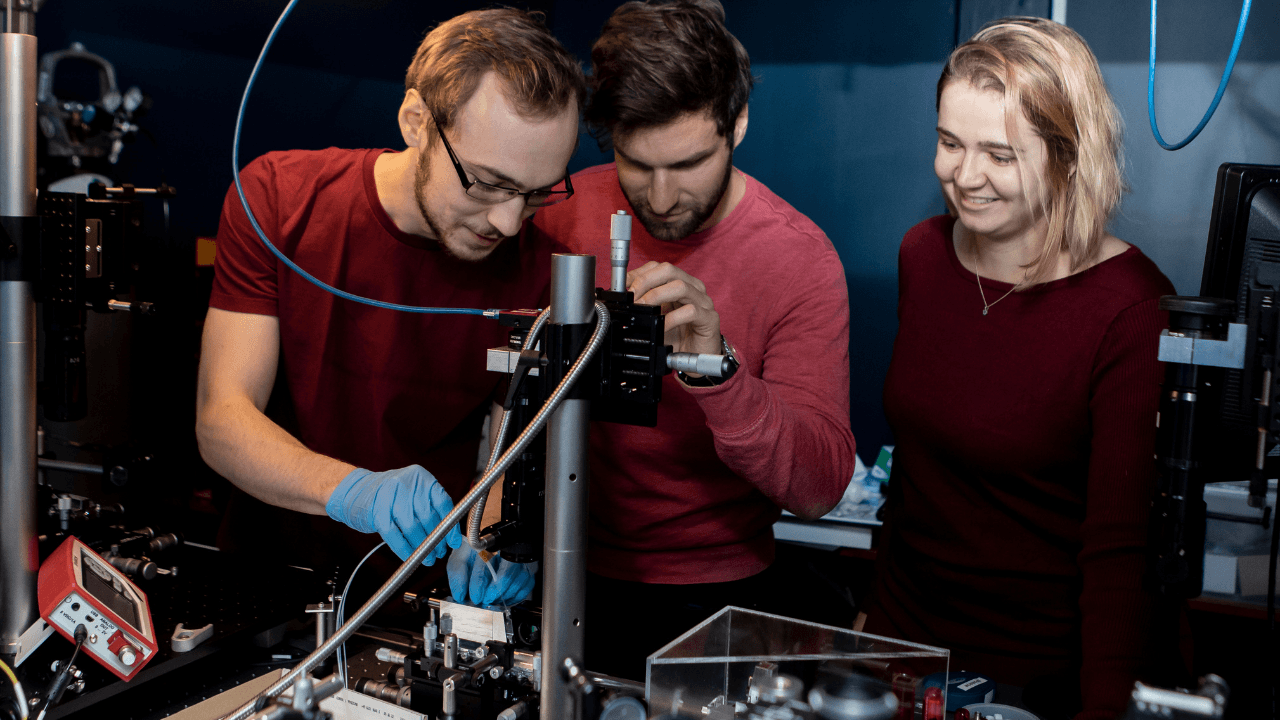Few would argue that 2023 has been the year of AI. But it's not the only deep tech worth your attention.
The ecosystem in quantum technology is rapidly evolving thanks to government investment and infrastructure, academic partnerships, university spinouts, and industry traction.
The race is on to scale quantum tech from conceptual to a solver of broader societal and economic impact.
Currently, the UK is the world's third largest quantum developing country, after the USA and China, attracting more startups and capital investment than any other European state.
But one investment company has its sights on a far smaller country with the potential to become a world leader in quantum technology — Denmark.
Quantum Exponential is the UK's first venture capital firm specialising in quantum technology, and recently opened its first European office in Copenhagen.
And according to Stuart Woods, CSO of Quantum Exponential, Denmark is the place to watch for the next explosion of quantum innovation — and it goes way beyond the supercomputers that captivate many journalists.
I spoke to Woods to learn more about why the company has its sights set on Denmark and about what this all means regarding the commercialisation of quantum computing and Europe's wider quantum strategy in Europe.
But first let's take a look at what's interesting about Denmark.
Quantum in Denmark: From Niels Bohr's Legacy to a Thriving Quantum Ecosystem
To date, 17 countries have invested in national quantum technology research and development programs, with an estimated spending of over $30 billion.
Denmark announced the second part of its National Quantum Strategy last month, focusing on the commercialisation, security and international collaboration in the field of quantum technology.
Besides this framework on paper, the country has the necessary, and proven, trinity – that interconnected relationship between academia, government, and enterprise/industry with real commercial use cases that turn the technology into something tangible.
According to Woods:
"The quantum field in Denmark is experiencing momentum, and we are excited to be at its epicentre.
Recent global dynamics and our deepened understanding of quantum technology make Copenhagen an ideal location for nurturing the next generation of quantum technology."
The government has allocated €161 million from 2024-2027 to strengthen Denmark's quantum ecosystem. It doesn't look all that impressive compared to the investments of the UK government, especially considering some of the big raises in the commercial that we've seen recently. Still, it's pretty good for a three-year project in a far smaller country.
Last year, the Niels Bohr Institute in Copenhagen also became the home of a new NATO Center for Quantum Technologies. The Center offers an accelerator site and incubator where companies can mature their technology and bring it to market, as well as test centres for developing components in quantum sensors, quantum encryption devices and quantum computers.
The new centre is also part of NATO's Defence Innovation Accelerator for the North Atlantic (DIANA), developing dual-use (civilian and defence) deep tech, which helps solve challenging defence and security problems.
Further, 2022 saw research from the Niels Bohr Institute of the University of Copenhagen receive a grant of $200 million from the Novo Nordisk Foundation to build a full-scale generally applicable quantum computer before the end of 2034. The project will run for 12 years in collaboration with research groups from leading universities and industries, including from the United States, the Netherlands, Canada and Denmark.
Part of the project includes a fabrication unit, "The Quantum Foundry P/S" to develop, engineer and build the parts needed for one of the world's first fully functional, fault-tolerant and generally applicable quantum computers — a huge boost for innovation in hardware engineering.
Additionally, Denmark is home to strong multidisciplinary sectors such as photonics, material science, nanotechnology, and computer science, which complement quantum research.
What does it mean to invest in quantum tech?
Quantum Exponential is one of two 100 percent quantum investment funds in the world — the other is Quantonation in France.
Since its launch in 2021, it has invested in seven quantum companies.
According to Woods, broadly, a third of investments has been in quantum computing, a third in quantum sensing, and the final third in network and encryption:
"While the media focuses on large quantum computers, we believe very strongly that quantum sensing will be much larger than quantum computing over the next two to three years, to the point where the word quantum will be dropped and it will become known simply as sensing."
Quantum sensing leverages quantum states for precision measurement.
Applications include timing, , navigation, subsurface mapping, and below-cell-level medical imaging, enabling less invasive diagnostics.
These individual quantum states have further enhanced sensitivity, which with the right infrastructure, can be leveraged for new medical understanding , advanced clock systems for mega data centres, and positioning technologies (e.g., for autonomous drones) to the detection of valuable raw materials deposits.
I was curious about Quantum Exponential's investment thesis.
Woods explained:
"We focus on businesses — a lot of what we see might well be a product line that might not be a business.
So we try to focus on the innovative elements of the investment side and think about how this particular element or technology will be a company and not just a product line of something bigger."
He cites examples in the company's current portfolio such as Oxford Quantum Circuits and Universal Quantum.
What can we expect from quantum in the near future?
Woods expects in the next year to see more quantum spin outs, as well as relocations and consolidations.
Over the last few years in Europe, there have been only a few.
Quantinuum acquired Cambridge Quantum Computing (UK) for an undisclosed amount in 2021.
January 2022 saw a merger between Pasqal, a developer of neutral atom-based quantum technology, and Qu&Co, a quantum algorithm and software developer.
Then, Danish company QDevil was acquired by Israeli company Quantum Machines in March 2022 for an undisclosed amount.
"So I think we'll have more spinouts, but also have more positive and constructive consolidations." "
He describes the quantum ecosystem as "patient" capital, but notes,
"However, at the same time, we are seeing other business models that are developing quite quickly.
We're seeing quantum computers now moving into data centres being put alongside cloud computing servers, simply because there is now a need and a business model, independent of the qubit count, actually to run and have access to that as a service.
We're looking at a cliff face. And we don't know how fast it's changing, but I think in the next year, we'll be surprised at just how fast things have changed and how far the industry has moved."
Danish Quantum Startups to watch

Sparrow Quantum is focused on advancing light-matter interfaces for quantum technologies.
The company is widely recognised as a leader in single-photon sources, demonstrating the world's highest light-matter coupling efficiency.
In May this year, the company raised €4.1 million to expand its team and increase its products and services.
Hafnium Labs supports chemicals, energy, and pharma companies by addressing a significant challenge in chemistry: swiftly obtaining dependable physical properties.
The company has developed a system for combining state-of-the-art predictive methods, such as quantum chemistry and AI, with experimental physical property data.
Called Q-props™it selects and qualifies all available data and applies quantum chemistry and molecular simulation fully automated, intelligent and transparently.
Use cases include drug discovery, process design, and troubleshooting production issues faster and creating truly predictive digital twins.
Molecular Quantum Solutions develops computational tools to accelerate research & development efforts by the pharma, biotech and chemical industry. Its tools use super- and quantum-computers with computational models and algorithms to calculate the properties of materials and chemicals quickly and efficiently.
Users can, for example, screen for new materials for batteries, green solvents, new drugs and biodegradable plastics instead of conducting costly experiments in the laboratory.
The company raised €600,000 in Pre-Seed funding in July this year.
NKT Photonics supplies high-performance fibre lasers and photonic crystal fibres such as supercontinuum white light lasers, low-noise fibre lasers, ultrafast lasers, and a wide range of speciality fibres.
They are used in quantum and nanotech, medical and life sciences, industrial applications, and aerospace and defence. In quantum tech, the hardware is used in quantum computing, sensing, and metrology.
Kvantify is a quantum and high-performance computing technology firm selling SaaS solutions based on cloud-native, quantum and high-performance computing, enabling businesses to access computer power without significant in-house investments. It helps clients find alternatives for all sorts of challenges in life sciences, financial services, logistics, and other functional areas.

For example, it has built solutions in pharmaceuticals and life sciences with built-in scaling capabilities and an HPC backend fully prepared to leverage quantum computing once the technology matures.
Since its founding in 2022, it has raised €2.5 million in funding and recently expanded its reach to the UK, where the team will work on using physical simulations and machine learning in drug discovery.



Would you like to write the first comment?
Login to post comments